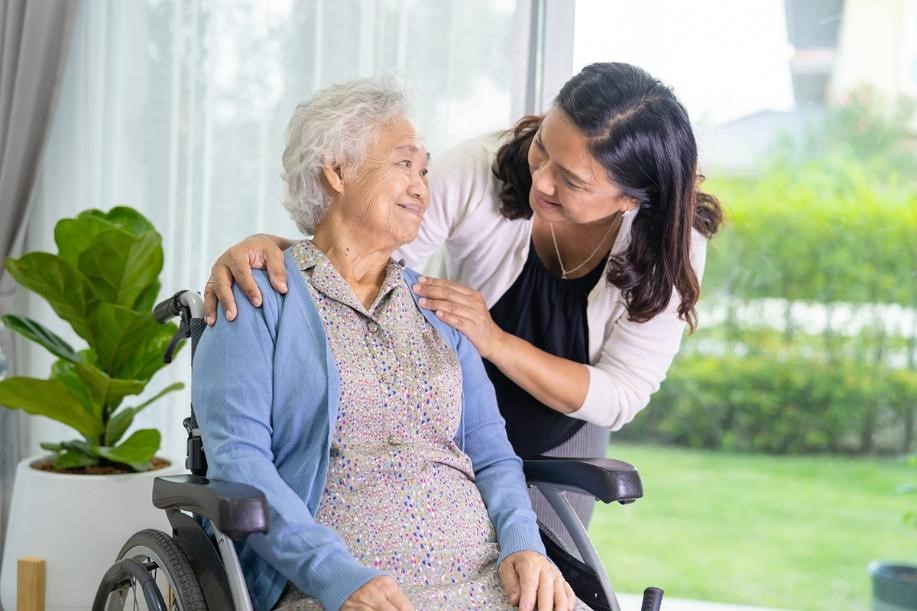
What Is a Degenerative Disorder?
A degenerative disorder is any condition that causes deterioration in the cells, resulting in gradual loss of function in organs or muscles. The disorder may affect a person’s brain and nerves, muscles, blood vessels, heart, or bones. Some degenerative illnesses are genetic, and some develop over time as a result of changes in the body or other contributing factors. Common degenerative disorders include:
- Alzheimer’s Disease
- Amyotrophic Lateral Sclerosis (ALS)
- Chronic Obstructive Pulmonary Disease (COPD)
- Cystic Fibrosis
- Heart Disease
- Multiple Sclerosis
- Muscular Dystrophy
- Osteoarthritis
- Osteoporosis
- Parkinson’s Disease
- Vascular Dementia
How Degenerative Disorders Affect the Elderly
Degenerative disorders often begin to display signs and symptoms as people age, and they may occur as a result of wear and tear on the body over time. Your loved one’s specific symptoms will vary based on the type of disorder they have, but here are some challenges they may encounter:
- Difficulty walking
- Difficulty dressing or bathing
- Memory challenges
- Increased risk of falls
- Balance problems
- Loss of movement or muscle weakness
- Chronic pain
The nature of degenerative disorders means that these challenges will most likely intensify over time. If your loved one has Parkinson’s disease, for example, he or she may initially experience muscle stiffness or a slight tremor which progresses to difficulty walking and then inability to walk. These challenges may be complicated by the changes your loved one experiences as a natural result of aging or by having more than one degenerative health condition.
How You Can Support Your Loved One

Talk to your loved one’s doctor.
It is vital that you understand the nature of the disorder and what to expect as it progresses. Your loved one’s doctor can also help you understand the various medications they are taking and help you know how to handle any complications or side effects.
Create a safe home environment.
Home modifications such as grab bars or non-slip treads may help your family member navigate hallways and rooms more easily. You may also want to consider eliminating the need for going up and down stairs. For example, consider installing a ramp to the front door if your loved one has difficulty with the steps. If your loved one has dementia or Alzheimer’s, watch for things like sharp objects or hot surfaces that could present a safety or fire hazard.
Encourage independence.
Retaining independence for as long as possible is a key factor in a person’s emotional health. As tasks become more difficult, it may be tempting to take over and do things for your loved one. Resist that temptation, and instead offer encouragement, stepping in to help only when they ask. That’s especially true if your loved one’s illness involves physical degeneration while they remain mentally sharp.
Enlist family members to help.
Caring for someone with a degenerative disorder can be difficult, and usually requires a lot of time and energy. Don’t be shy about asking for help from family members. Even if they don’t live nearby, you can encourage them to call, come for a visit, or help oversee finances. For those that do live in town, consider setting up a rotation so that everyone can take a rest when needed.
Seek support for your loved one and yourself.
The physical and mental toll a degenerative illness takes on everyone involved can quickly spiral into depression without the right support network. Seek out Ohio support groups both for your family member and for yourself so you can talk to others in similar circumstances.
Additional Care Support
It’s not always possible for you to provide the full extent of care your loved one needs as they face the challenges of a degenerative disorder. Additional support can provide the help you need to give your loved one quality care in a comfortable environment. Here are some ways you and your family can benefit:
- Home care in shorter intervals—You may not need a full-time caregiver, but home care can step in to assist while you are at work or out of town.
- Respite care—All caregivers need to take breaks in order to maintain their physical and emotional health. Respite care ensures that your family member receives quality care while you take time for rest.
- Grocery shopping and transportation—During the early stages of a degenerative illness, your loved one may be able to maintain a lot of independence. A home caregiver can step in to help with things like grocery shopping and transportation to appointments so that your loved one can remain comfortable, confident, and safe.
- Companionship—Degenerative disorders can be isolating as your loved one finds it more difficult to get out of the house. Companionship is an important element of care, and if family members don’t live nearby it can be hard to come by. Home caregivers offer that essential connection and conversation your loved one needs.
For more information about how home care can help you and your loved one face the challenges of degenerative disorders with confidence, download our free Guide to Home Care.
{{cta(‘6a691ae8-409b-4b09-a1d5-2864ffe1c1b5′,’justifycenter’)}}






